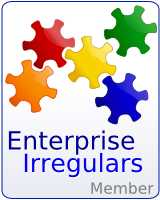Oracle Business Intelligence and Analytics briefing New York, March 22, 2006
I attended some presentations of this event today. Please find my notes attached. Feel free to leave comments with any questions you may have. Also, I understand that a webcast will be available on the Oracle website.
What technologies will be the centerpiece of Oracle Fusion Analytics? Is it Siebel Analytics? What about PeopleSoft EPM?- Oracle Business Intelligence Suite includes
- Siebel Business Analytics
- Oracle DB (they hit the point repeatedly throughout the presentations that there is BI functionality built into the db)
- Fusion Middleware
- Enterprisewide Analytic Applications
- 3 Products
- Oracle Business Intelligence SE1
- aimed at mid-market, "going after Microsoft"
- $25k "for everything"
- 2 processors allowed
- SE1 db
- Oracle Business Intelligence SE
- For largely Oracle db environments
- Discoverer
- Discoverer OLAP
- Discoverer Plus
- Discoverer View
- Oracle Business Intelligence Enterprise Edition (EE)
- For hetergeneous environments
- Analytic server
- My sense is that this is primarily the Siebel product
- 25% of Siebel revenue was coming from their BI products and this was growing (hedge fund guy next to me that follows Oracle seemed to think it was even more then this)
- Phillips - BI always part of our platform, Siebel will allow us to accelerate this
- Unclear what the role of Peoplesoft EPM is. Was mentioned, but not to a great degree or in much detail
What will happen to all of Oracle’s other BI products (aka Discoverer, Daily Business Intelligence)? - Discoverer looks like it's being marketed as BI SE
- Unclear about role of Daily BI
Who will lead the Business Intelligence Business Unit?- Phillips indicated it would be Thomas Kurian
Other notes:Phillips
- Enterprise BI @ Cisco Systems
- 8000 users going to 20,000
- Sales/Marketing, HR, top 500 Execs
- Understand this is the Siebel product
- Go to Market
- Specialist BI sales force
- Specialist BI consultants
- Focused partner + channel development
- Protect, Extend, Evolve
- Protect - Oracle will offer Lifetime support on all its BI products. "not like some other vendors"
- Extend
- New capabilities
- Analytic applications extend value for Oracle EBS, Peoplesoft, Siebel and SAP customers
- Evolve
- Fusion Apps
Henry Morris
- Presentation based on his 11/05 study entitled "Oracle + Peoplesoft + Siebel: What does the combination mean for BI, Analytics and Performance management?"
- Oracle should leverage the Siebel acquisition to extend functionality
- Important to maintan investment in Performance management in Peoplesoft
Thomas Kurian
- Product Strategy
- Integrated BI Tools
- Best of Breed, next generation BI infrastructure
- Integrated BI database
- BI functions integrated in database
- Integrated Analytic Applications
-> BI = applications + leveraging database
- BI built on common platform
- common metadata, UI, security model
- unified notion of information against what you perform calculations
- Integrated tools & technology





